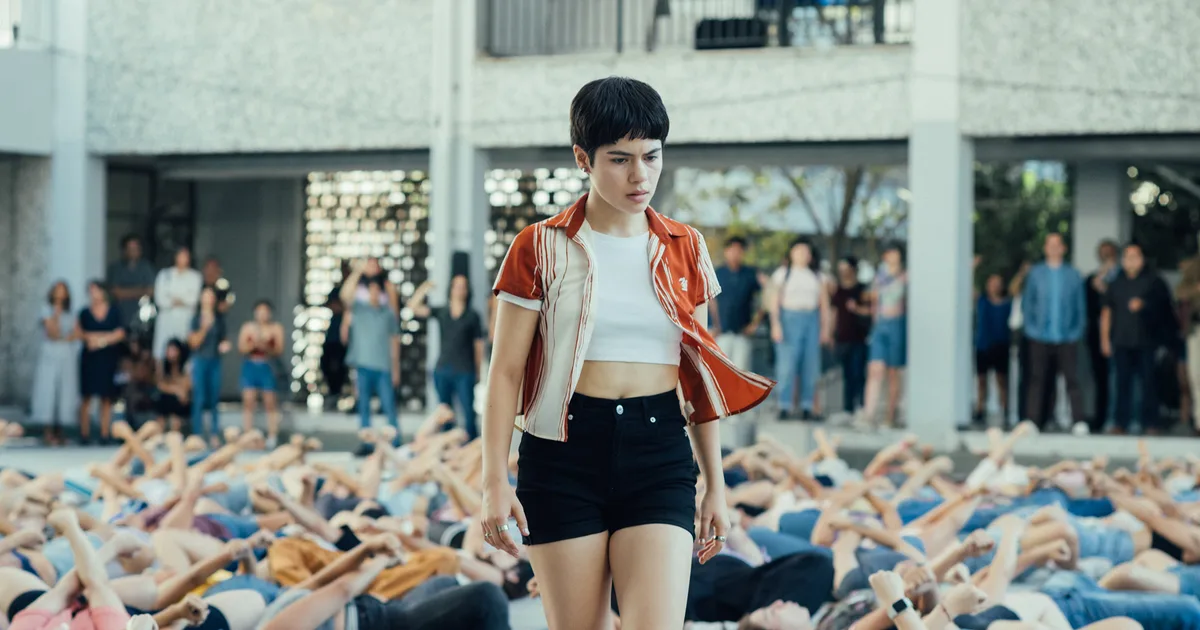
There is a delicate threshold separating self-awareness from petulance, and the directors who know how to best thread it understand that saying less often does the most. With The Wave, Sebastián Lelio offers a staunch, loud example of the opposite, crafting a film that is not only comfortable to stay within the realm of the self-congratulatory but expects you to applaud him for it too.
The Chilean director follows up his Oscar-winning drama A Fantastic Woman with a musical loosely based on the 2018 #MeToo-adjacent demonstrations that closed multiple colleges in Chile after students occupied the buildings to demand stronger punishment for sexual harassment within the campus. In this fictionalized effort, one such student is Julia (Daniela Lopez), a music pupil whose big ambitions are juxtaposed with the humble setting of her mother’s mini-mart, where the family also lives.
Get more Little White Lies
Lelio creates Julia as a stand-in for the many young women who bravely came forward with their stories of abuse during the titular movement, having her as the face of the rebellion and the key witness for the protestors’ case. This pivotal narrative choice is the first of many mishaps in a deeply misguided film, as it burdens with responsibility a character whose entire arc revolves around a pronounced resistance to victimization. The director isn’t explicitly asking for sympathy as much as empathy for Julia, but there is no sheltering the character from the purposefully exhausting framing she is seen through.
Julia pointedly chews gum, the impossibly irritating, moist noise a frequent sensorial companion to her screen presence. After draining it of flavour, she plucks it from her mouth and, still wet, pushes it under whichever surface is nearest — be it a diner table or the cold, metallic work desk in the corner of a police station. It is as if Lelio is trying to hammer in the point that women do not need to be likeable and contained to be believed, a plot boomerang that ricochets with great force only achieving condescension.
The gum-chewing isn’t the only thing Lelio hammers at with gusto throughout the musical. He often dwells inside the mini-mart, the camera almost a safari guide introducing the viewer to this world that could not possibly elicit anything else than a flight response. At the university, several scenes consist of the same beats, tracking the young women as they gather and disperse, gather and disperse. On the musical front, with the exception of a big number within its first minutes, the film’s first hour is almost entirely dedicated to extensively laying out a story that has already been made clear almost from the get-go, a tiresome stretch that dilutes the dramatic, grandiose potential of the genre.
As it finally steps on the gas, The Wave at last dedicates some time to properly prod at the thorniness of trauma and denouncement, zooming into Julia’s assault by fellow student Max and the spiral of guilt and shame it sent her downwards. Although the musical sequences are welcome as they at least add some dynamism to the repetitiveness of what came before, the music proves uninspired and the lyrics exacerbate the tonal issues of the script. “Paradigm shift, no more stigma,” boasts Max, echoed by other assailants and those who support them in a sequence that is meant as satire but lands as bitterly as the mindbogglingly self-indulgent number that follows, when Lelio goes meta to let the audience knows that he is well aware there will be be agnostics when it comes to a man directing a film about feminism and women’s rights.
But here’s the thing: the issue at hand is not as much that this is a man tackling conversations around women’s bodies and political sisterhood, but that the man in this case directs with such a grave masculine gaze and foreignness to the complexities of womanhood that what lingers is the sour taste that the call is coming from inside the house. South America has the world’s highest rates of misogynistic violence, with femicide rates growing every year, and abortion is still largely illegal across the continent. To have a high-profile South American director shine a light on the real-world impact of feminism in a continent ungoverned by the intricately American politics of #MeToo is a heartening proposition, but, unfortunately, it feels like The Wave doesn’t want you to empathise with the cause as much as it wants you to praise its director.
